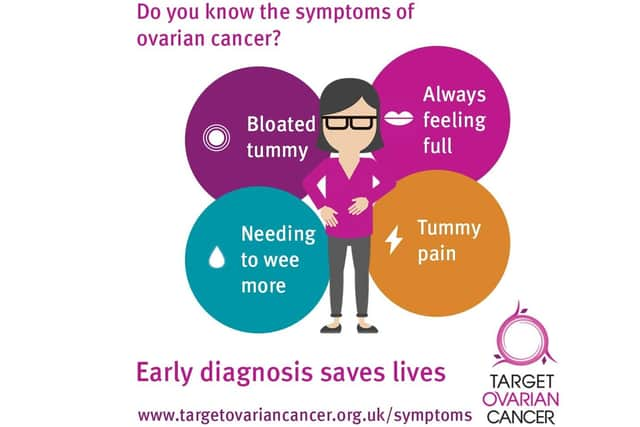Desborough mum given incurable ovarian cancer diagnosis visited her GP 11 times
and live on Freeview channel 276
A Desborough woman told she has incurable ovarian cancer visited her GP 11 times to report her symptoms before finding out why she was suffering.
Mo Easton waited over a year for the right diagnosis and is now living with her fourth recurrence of the deadliest gynaecological cancer – ovarian cancer.
Advertisement
Hide AdAdvertisement
Hide AdThe 77-year-old is working with charity Target Ovarian Cancer to highlight its latest state-of-the-nation report highlighting lack of progress in combating the disease.


Mother-of-two Mo, a former primary school headteacher, said: “Seven years ago, I had symptoms of ovarian cancer but didn’t realise. I didn’t know at the time that the bloating, abdominal pain, feeling full and needing to wee more urgently were all signs.
"I had 11 visits to the GP before I found out I had ovarian cancer and it was advanced. Before this, due to chronic constipation, I was even told that I might have IBS (irritable bowel syndrome) – something very rarely diagnosed in the 50 plus. I later found out I did have ovarian cancer and it was advanced.
“I was diagnosed with high grade serious ovarian cancer stage III. The consultant said, ‘you have incurable ovarian cancer and you’ll be on palliative care until you die’. This is why it is really important to me that I speak to everyone about ovarian cancer and its symptoms.
Advertisement
Hide AdAdvertisement
Hide Ad"Ovarian cancer doesn’t feel known. Many of us aren’t aware of the symptoms. We need to get this knowledge out there and help people to understand the disease, as this might mean people receive an earlier diagnosis.”


The Pathfinder 2022: Faster, further, and fairer report reveals that if diagnosis was faster, further support was available and access to treatment was fairer, there could be potential for more women to survive, live well with ovarian cancer and be supported from diagnosis and throughout treatment.
Findings showed that just one in five women know that bloating is one of the key symptoms of ovarian cancer. Over a quarter of women make three or more visits to their GP before being referred for tests and nearly a third wait over three months from first visiting their GP for the correct diagnosis.
Being diagnosed with the disease has a massive negative impact on mental health.
Advertisement
Hide AdAdvertisement
Hide AdMo said: “I was annoyed and disappointed with my surgery but you can’t expect GPs to be experts and now there’s a shortage of specialists.


"I’m trying to look on the bright side. I saw two of my grandchildren graduate, something I never thought I would be there for. I have a good life and know that I’m very lucky. My nurse and Macmillan nurse have been incredible.”
Target Ovarian Cancer is calling for a combination of national symptoms awareness campaigns and more training and support for GPs, which will lead to earlier diagnosis of ovarian cancer, access for all to treatment, widespread improvements in support, notably mental health support, as well as an urgent investment in the Clinical Nurse Specialist workforce.
Annwen Jones, chief executive of Target Ovarian Cancer, said: “While there has been some improvement in recent years, our report clearly shows that we now need action taken to secure progress which is faster, further and fairer.
Advertisement
Hide AdAdvertisement
Hide Ad“We are hopeful that with the right targeted investment and backing from the government we can achieve this together, prolonging and saving lives.
“Since our last Pathfinder report in 2016, we have worked tirelessly to transform the lives of those living with ovarian cancer, despite the setbacks of the pandemic. We have achieved the first government-funded national symptoms awareness campaign and the first national ovarian cancer audit, and we have seen the introduction of ground-breaking new treatments like PARP inhibitors and wider genomic testing. Progress is possible, but Pathfinder demonstrates that these improvements are not enough. Ovarian cancer is not going away. We can change the course of this disease.”
Following its report, Target Ovarian Cancer is calling on the public to write to their MPs to bring about urgent action to raise the profile of ovarian cancer and the devastating impact it is having on people’s lives saying ‘enough is enough’.
A delayed diagnosis can have a significant impact on treatment options and chances of survival. NHS England is committed to ensuring that three quarters of cancers are diagnosed at an early stage (stage I or II) by 2028.
Advertisement
Hide AdAdvertisement
Hide AdDr Victoria Barber, GP at Parklands Surgery in Rushden and part of the Target Ovarian Cancer GP Advisory Board, said: “We want better access and support for GPs. No GP wants to miss a diagnosis of ovarian cancer or misdiagnose. They want to help their patient and provide them with the best care and solution possible. Target Ovarian Cancer is already leading the way with early intervention in GP practices across the country, but we need government backing to roll this out UK wide and support our GPs and empower them.”
Mo is now receiving treatment for Lymphoedema, a condition that causes swelling in her body's tissues as a result of having her lymph nodes removed. She is finding it harder to get out but still enjoys her garden and seeing her family.
She said: “I know that I have been very lucky in my life.”
What are the symptoms of Ovarian Cancer?
- Persistent bloating – not bloating that comes and goes
- Feeling full quickly and/or loss of appetite
- Pelvic or abdominal pain (your tummy and below)
- Urinary symptoms (needing to wee more urgently or more often than usual)
Occasionally there can be other symptoms:
- Changes in bowel habit (eg diarrhoea or constipation)
- Extreme fatigue (feeling very tired)
- Unexplained weight loss
- Any bleeding after the menopause should always be investigated by a GP
Symptoms will be: Frequent, persistent and new